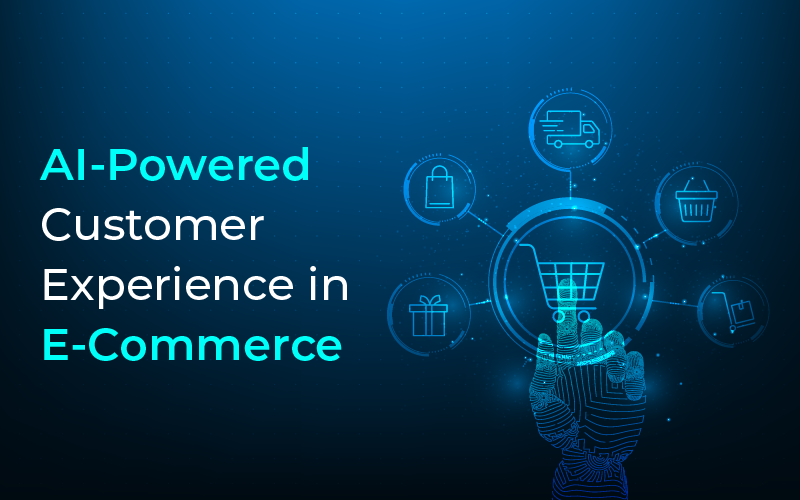The AI Revolution is Here to Enhance the E-commerce Customer Experience
Artificial intelligence (AI) is rapidly transforming various sectors, and e-commerce is no exception. By leveraging artificial intelligence technologies like machine learning, deep learning, and natural language processing, businesses can significantly enhance customer experience, build stronger relationships, and gain a competitive edge in the digital marketplace.
This is evident in the evolving eCommerce industry trends, where artificial intelligence is becoming increasingly crucial, particularly in areas like automating customer service and personalized marketing.

This blog post will delve into the multifaceted ways AI for eCommerce can revolutionize e-commerce customer experience, covering key aspects like personalized recommendations, proactive customer support, and intelligent chatbots.
This exploration will highlight the use of AI in business, specifically within the e-commerce domain, demonstrating how AI can drive customer satisfaction and business growth.
1. Personalized Recommendations: A Tailored Shopping Journey
One of the most impactful ways artificial intelligence tools enhance customer experience is through personalized recommendations. By analyzing vast amounts of customer data, including browsing history, purchase history, and preferences, AI algorithms can:

- Create personalized product feeds:
Imagine walking into a store where the shelves seem to know you. That’s the magic of AI in e-commerce! AI can cleverly tailor your online shopping experience by showing you products you’ll actually love. It’s like having a personal shopper who understands your style and helps you find exactly what you’re looking for.
This personalized touch, powered by artificial intelligence technologies, makes shopping more fun and less overwhelming. By embracing ai for ecommerce, businesses can effectively use automating customer service to guide you with personalized recommendations, making you feel valued and more likely to return for more.
- Offer relevant product suggestions:
AI-powered recommendation engines can suggest products that perfectly align with individual customer needs and interests. This significantly improves the customer experience, leading to higher conversion rates and greater loyalty.
This is a prime example of how the use of ai in business, specifically through automating customer service with personalized product suggestions, can significantly improve customer satisfaction and drive sales.
- Deliver targeted promotions:
AI can identify customer segments with specific needs and preferences, enabling businesses to deliver highly targeted promotions and offers. This ensures that customers receive relevant and enticing deals, increasing their engagement and driving conversions.
This capability highlights artificial intelligence technologies’ power in effectively segmenting customer bases. By leveraging the uses of artificial intelligence, businesses can refine their marketing strategies, improve customer engagement, and ultimately boost their bottom line.
2. Proactive Support with AI for E-commerce
AI empowers businesses to address customer issues before they escalate proactively. By analyzing customer data and identifying potential pain points, AI can:
- Predict and prevent issues:
Think of AI as a super-smart assistant that can predict customer troubles before they even happen! Artificial intelligence technologies like machine learning help this AI ‘assistant’ analyze how customers interact with your business, spotting patterns and flagging potential problems.
This means your business can be proactive, like a helpful friend, and address issues like delayed shipments or faulty products before they frustrate your customers.
- Offer proactive support:
The power of AI is in ‘action’. Based on predicted issues, AI can proactively reach out to customers with helpful solutions, showing that they truly care. By anticipating and addressing potential problems, businesses demonstrate a proactive and customer-centric approach, building strong brand loyalty.
By prioritizing customer satisfaction, businesses can create a powerful brand following and a thriving community of advocates.
- Optimize support processes:
AI can analyze customer support interactions to identify areas for improvement in processes and workflows. This leads to more efficient and effective support, resulting in quicker resolution times and higher customer satisfaction.
By leveraging AI to automate customer service tasks and analyze interactions, businesses can gain valuable insights into customer pain points and optimize support processes for a smoother and more efficient customer experience.
AI-powered chatbots have become an indispensable tool for enhancing customer experience in e-commerce. In line with the latest ecommerce industry trends, businesses are increasingly adopting AI-powered chatbots to provide 24/7 support, answer customer queries, and assist with purchases. These intelligent virtual assistants can:
3. Intelligent Chatbots: 24/7 Customer Engagement

- Provide instant support:
Chatbots, powered by artificial intelligence tools, can provide instant support to customers 24/7, addressing common queries, providing product information, and assisting with order tracking. This guarantees that customers can access immediate assistance, no matter the hour. - Personalize interactions:
By leveraging customer data, chatbots can personalize interactions, addressing customer needs and preferences in a more relevant and engaging manner. This demonstrates one of the many uses of artificial intelligence in enhancing customer experiences through personalized interactions. - Handle complex tasks:
Advanced chatbots can handle more complex tasks, such as assisting with returns, exchanges, and troubleshooting technical issues. By streamlining operations, we enable our agents to provide superior customer service.
4. Voice Assistants: Seamless and Intuitive Shopping
The integration of artificial intelligence tools into voice assistants like Alexa and Google Assistant is revolutionizing the e-commerce industry, offering a more intuitive and efficient shopping experience. AI-powered voice assistants can:
- Provide real-time assistance:
Voice assistants can provide real-time assistance during the shopping journey, answering questions, resolving issues, and guiding customers through the checkout process. By automating customer service tasks through voice assistants, businesses can provide efficient and personalized support to customers, improving overall satisfaction and loyalty.
- Enable voice-based shopping:
Customers can use voice commands to browse products, place orders, track shipments, and even return items. This provides a seamless and intuitive shopping experience, especially for those who prefer a hands-free approach.
By leveraging ai for ecommerce, businesses can effectively utilize automating customer service through voice assistants, enhancing customer satisfaction and driving sales.
Offer personalized voice experiences: Voice assistants can personalize the shopping experience by tailoring recommendations, promotions, and interactions based on individual customer preferences.
5. Sentiment Analysis: Understanding Customer Emotions
AI-powered sentiment analysis tools can analyze customer feedback, including reviews, social media posts, and survey responses, to understand customer emotions and identify areas for improvement. By analyzing sentiment, businesses can:
- Identify areas of concern:
Sentiment analysis can help identify areas of concern, such as negative product reviews, customer complaints, and negative brand sentiment. This allows businesses to address issues proactively and improve customer satisfaction. - Gain insights into customer preferences:
By analyzing customer sentiment, businesses can gain valuable insights into customer preferences, needs, and expectations. This information can be used to refine product offerings, improve customer service, and enhance the overall customer experience. - Monitor brand reputation:
Sentiment analysis can be used to monitor brand reputation across various channels, allowing businesses to identify and address potential reputational risks.
6. Predictive Analytics: Anticipating Customer Needs

Elevate your business with AI-powered predictive analytics. By anticipating future customer needs, you can proactively tailor your offerings and strategies for your business, driving growth and customer satisfaction. By leveraging predictive analytics, businesses can:
- Predict customer churn:
By identifying customers at risk of churning, businesses can proactively reach out with targeted offers and incentives to retain their loyalty. - Forecast demand:
Predictive analytics can help businesses forecast product demand, enabling them to optimize inventory levels and ensure that they have the right products in stock at the right time. - Personalize marketing campaigns:
Predictive analytics can be used to personalize marketing campaigns, targeting the right customers with the right messages at the right time. This increases the effectiveness of marketing efforts and drives higher conversion rates.
7. Fraud Detection: Enhancing Security and Trust
AI-powered fraud detection systems can analyze customer behavior and transaction data to identify and prevent fraudulent activities, such as credit card fraud and account hacking. By utilizing cutting-edge artificial intelligence tools, AI empowers organizations to strengthen security protocols, thereby building customer trust and protecting their valuable information.
8. Augmented Reality (AR) and Virtual Reality (VR): Immersive Shopping Experiences
AI is playing a crucial role in the development of AR and VR technologies, which are transforming the way customers interact with products and brands. By leveraging AR and VR, businesses can:
- Create virtual stores and showrooms:
VR technology can be used to create virtual stores and showrooms, allowing customers to explore products and interact with brands in a more immersive and interactive way. This innovative approach demonstrates the use of AI in business to enhance customer experiences and drive sales.
- Offer immersive product experiences:
With AR, futuristic shopping experiences are becoming a reality! Customers can visualize products in their own space, making the shopping process more fun and less risky. This immersive and engaging experience leads to happier customers and fewer returns.
9. Hyper-Personalization: Tailoring Experiences to Individual Needs
AI is revolutionizing the way businesses interact with customers, making it feel like they’re reading your mind! By analyzing your past purchases and browsing history, AI can tailor product recommendations and promotions just for you.
It’s like having a personal shopper who knows your style and preferences. This hyper-personalized approach makes shopping more enjoyable and efficient, leading to stronger customer relationships and increased loyalty.
10. Continuous Improvement: A Data-Driven Approach
AI is like a smart assistant that helps businesses constantly improve. By analyzing customer data and feedback, AI can identify areas where things can be better, from product offerings to customer service.
This data-driven approach helps businesses stay ahead of the curve in the ever-evolving e-commerce industry trends. By using AI to optimize their operations, businesses can deliver exceptional customer experiences that keep customers coming back for more.
- Challenges and Considerations:
As amazing as AI is, there are still some hurdles to overcome in the world of e-commerce.:
- Protecting your privacy:
Collecting and using customer data requires careful consideration of data privacy and security regulations. Businesses must ensure they collect and use customer data responsibly and ethically.
- Bias and fairness:
AI algorithms are trained on historical data, which may contain biases. It is crucial to ensure that AI systems are fair and unbiased, avoiding any discrimination against specific groups of customers.
Explainability and transparency:
AI can be a bit of a black box, making it hard to understand how it reaches its conclusions. It’s crucial to make sure AI decisions are clear and easy to follow, both for businesses and customers.
Implementation and integration:
Implementing and integrating AI-powered solutions can be complex and challenging. Businesses need to have the necessary resources and expertise to implement and manage AI technologies successfully.
Ethical considerations:
It is crucial to consider the ethical implications of using AI in e-commerce, such as the potential for job displacement and the impact on customer autonomy.
Conclusion:
Artificial intelligence is revolutionizing the e-commerce landscape, empowering businesses to deliver personalized, proactive, and engaging customer experiences. By leveraging advanced artificial intelligence tools and technologies, businesses can build stronger customer relationships, drive higher levels of engagement and loyalty, and gain a significant competitive advantage in the digital marketplace.
E-commerce website development services can leverage AI to enhance the customer experience, ensuring that businesses can create truly exceptional customer experiences that will drive long-term success in the ever-evolving world of e-commerce.
E-commerce website development agencies can also utilize AI to streamline their development processes, improve efficiency, and deliver high-quality solutions to their clients.



1 comment
Thanks for breaking down AI’s role in e-commerce! Personalized recommendations and chatbots stood out—so much potential here. Great insights!